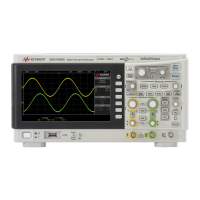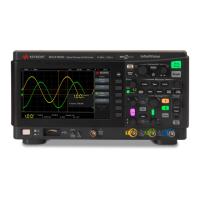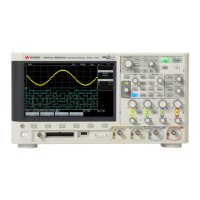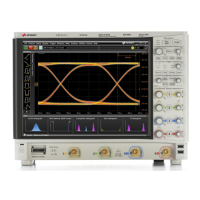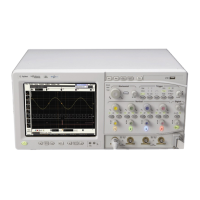322 Keysight InfiniiVision HD3-Series Oscilloscopes User's Guide
25 CAN Triggering and Protocol Decode
You may need to adjust the sample point to get a reliable trigger and
decode, depending on your CAN FD network topology and where the
oscilloscope probe is located in the network.
• Standard — Select the standard that will be used when decoding or
triggering on FD frames, ISO, or non-ISO.
This setting has no effect on the processing of non-FD (classical) frames.
• XL Rate Settings — When decoding CAN XL:
• Baud — Select the CAN XL baud rate of the signal from your device under
test.
If the desired baud rate is not shown in the list, select User Defined and use
the User Baud field to enter the baud rate.
The CAN XL baud rate can be set to predefined baud rates from 1-10 Mb/s
or a user-defined baud rate from 10.0 kb/s to 10 Mb/s in increments of
100 b/s.
If the baud rate you select does not match the CAN XL baud rate, false
triggers and decoding may occur.
• Sample Point — Specify the sample point.
The sample point is the point during the bit time where the bit level is
sampled to determine whether it is dominant or recessive. The sample point
represents the percentage of time between the beginning of the bit time to
the end of the bit time.
You may need to adjust the sample point to get a reliable trigger and
decode, depending on your CAN XL network topology and where the
oscilloscope probe is located in the network.
• Standard — Select the standard that will be used when decoding or
triggering on FD frames, ISO, or non-ISO.
This setting has no effect on the processing of CAN and CAN FD frames.
Settings The CAN protocol decode mode has these controls for decode settings:
For CAN XL, the Standard Rate Settings, the FD Rate Settings, and the XL Rate Settings must
be set correctly.
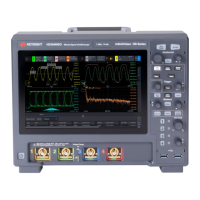
